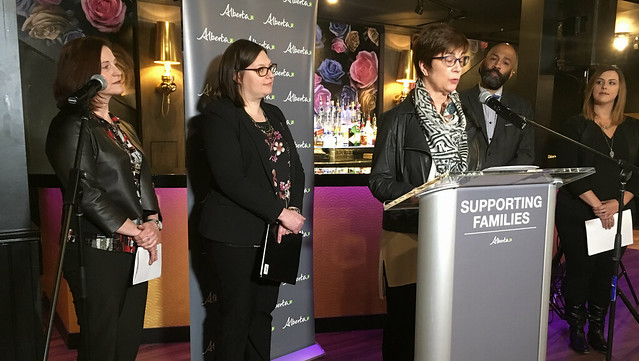This release was issued under a previous government.

Dr. Karen Grimsrud speaks about the need for community work to raise awareness on the opioid crisis.
The projects will focus on reducing stigma, help people learn where they can find life-saving resources and educate families, friends and neighbours on how they could potentially save a life.
“Building greater awareness and supporting conversation around substance use is key to breaking down stigma and saving lives. From suburban neighbourhoods to the inner city and from university campuses to the entertainment industry – these projects will help promote understanding and awareness of this public health crisis.”
The grants put funds into the hands of people and agencies who know their local communities best.
“An opioid poisoning can happen to anyone, regardless of income or where you live. I’m proud of the work the province is doing to address the opioid crisis and grateful for this grant that will help support greater conversation and decrease stigma associated with substance use.”
“We believe every conversation counts and this philosophy has inspired the project we are launching – creating safe environments for people to come together and foster a better understanding of addiction, evidence-based treatment options and harm reduction. These funds will allow our organization to meet and connect with even more Calgarians.”
“Through the University of Calgary’s Campus Mental Health Strategy, we recognize our role in creating a culture where our community feels supported, where we care for each other, and where we learn and talk about mental health in a non-judgmental way. This funding will allow us to increase harm-reduction and anti-stigma education and equip our community with protective strategies to stay safe.”
“Rural Alberta communities are struggling with the opioid crisis, yet often lack the resources to support those struggling with substance use. This lack of awareness and knowledge may lead to lives lost. With the Rural Community Opioid Outreach Program, the Alberta Rural Development Network will provide support and assistance to rural communities who want to educate citizens in a way that’s adapted to their local needs, and enhance access to services in a way that will provide them the tools and information needed to save lives.”
“I’m excited to see how these unique projects spark conversation and understanding around this public health crisis that continues to impact every community. We, in both the health ministry and on the opioid commission, know the importance of really listening to the stories of people with lived experience so that we can take meaningful action on the ground and help families and Albertans.”
Supporting the public awareness grants – which was recommended by the Minister’s Opioid Emergency Response Commission – is one of many actions being taken by the government of Alberta. The province has distributed more than 49,000 free naloxone kits, and more than 3,300 overdose reversals have been reported. The province is also committing operating funds to six supervised consumption sites and is increasing access to opioid treatment programs.
The province’s latest interim opioid data report shows that 74 people died from an apparent fentanyl poisoning in the first six weeks of 2018. That compares to 119 people who died of an apparent fentanyl poisoning in the last six weeks of 2017. Last year, 589 people in Alberta died of an apparent fentanyl poisoning.
Quick facts
- Alberta has provided $1.4 million in grants to 29 projects:
- $446,000 to seven projects that are provincial in scope
- $65,000 to three projects in southern Alberta
- $328,000 to seven projects in the Calgary region
- $65,000 to one project in central Alberta
- $275,000 to seven projects in the Edmonton region
- $220,000 to four projects in northern Alberta
- Grants range from $10,000 to $100,000